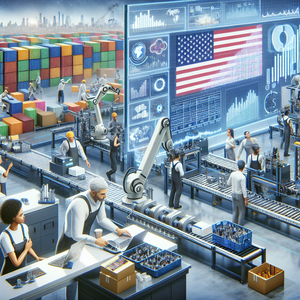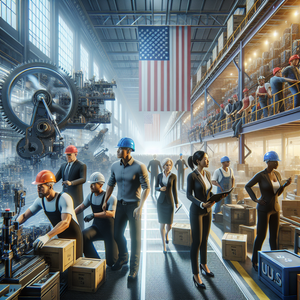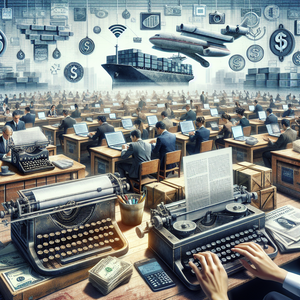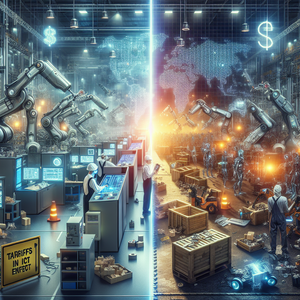
Tariffs and U.S. Manufacturing Jobs: Navigating the Challenges, Opportunities, and Evolving Careers
The debate over tariffs has brought about significant changes in the U.S. manufacturing landscape, sparking both renewed opportunities and complex challenges. Tariffs, often implemented as a strategy to protect domestic industries, encourage companies to bring production back to the U.S., thereby creating jobs and revitalizing local economies. For instance, Samsung’s decision to relocate appliance production to the U.S. is a direct response to tariff policies, promising new manufacturing roles. Similarly, industries like steel and solar panels have increased domestic output, adapting to higher costs of imported materials.
Job Summaries:
Manufacturing Engineer:
- Manufacturing engineers streamline production processes as companies relocate operations domestically to mitigate tariff costs.
- They focus on reducing reliance on imported components, improving factory efficiency, and ensuring cost competitiveness.
- Demand for these professionals continues to rise as reshoring efforts gain traction.
Supply Chain Analyst:
- Supply chain analysts navigate new logistical challenges created by tariff-induced trade shifts.
- They evaluate sourcing options, optimize inventory, and identify alternative suppliers to mitigate costs.
- Expertise in logistics, data analysis, and supply chain software is essential for success in this role.
Trade Compliance Specialist:
- Trade compliance specialists analyze tariff policies, ensure adherence to customs laws, and develop strategies to minimize international trade costs.
- Industries like automotive and electronics manufacturing rely on these experts to avoid penalties and maintain compliance.
Production Supervisor:
- Production supervisors manage factory operations as businesses adapt to higher domestic production costs.
- They streamline workflows and scale operations to meet demand for locally produced goods, requiring leadership skills and industrial management experience.
Industrial Designer:
- Industrial designers create innovative, cost-competitive products for domestic markets as tariffs raise the cost of imports.
- They collaborate with engineers to design products tailored to U.S.-based production capabilities.
- Requiring a degree in industrial design and proficiency in CAD software.
Logistics Manager:
- Logistics managers oversee the movement of goods and navigate higher shipping costs caused by tariff-driven trade disruptions.
- They optimize shipping routes and negotiate with carriers.
- Requiring a degree in logistics or supply chain management and leadership experience.
Policy Analyst:
- Policy analysts research trade policies, evaluate their effects, and recommend strategies to businesses and policymakers.
- Industries like steel and solar panels rely on these professionals to assess tariff-related challenges and opportunities.
- Requiring a background in economics, political science, or public policy.
Quality Assurance Specialist:
- Quality assurance specialists maintain high standards in new domestic production environments.
- They implement quality control systems and troubleshoot defects, with industries like solar panels increasingly relying on their expertise.
- Certifications like Six Sigma are valuable for this role.
Customs Broker:
- Customs brokers navigate the complexities of importing and exporting under new tariff regimes.
- They handle customs documentation, calculate duties, and ensure compliance with global trade laws.
- Requiring a U.S. Customs and Border Protection license and expertise in international trade.
Sustainability Consultant:
- Sustainability consultants help companies adopt eco-friendly and cost-effective practices in response to rising production costs due to tariffs.
- They guide businesses in implementing energy-efficient technologies and sourcing sustainable materials.
- A background in environmental science or sustainability is required.
Economic Researcher:
- Economic researchers analyze the broader effects of tariffs on industries, employment, and consumer behavior.
- They publish reports and advise policymakers.
- Requiring a degree in economics and advanced statistical skills.
Procurement Manager:
- Procurement managers source raw materials domestically to offset tariff-related costs.
- They facilitate shifts to local suppliers, requiring strong negotiation skills and expertise in supply chain management.
Automation Specialist:
- Automation specialists implement robotics and advanced technologies to streamline manufacturing processes, offsetting rising production costs.
- Factories producing appliances and electronics increasingly adopt automation, driving demand for experts in robotics and programming.
Marketing Strategist:
- Marketing strategists reposition domestic goods as premium alternatives to imports.
- They craft campaigns emphasizing quality, sustainability, and patriotism.
- This role requires creativity and a background in marketing.
The tariff-induced shifts in U.S. manufacturing have created a dynamic and evolving job market. While challenges like higher costs and disrupted supply chains persist, these changes have also spurred demand for specialized roles in engineering, supply chain management, and automation. As companies adapt to this new reality, job seekers have the opportunity to position themselves at the forefront of a transforming industry. Whether you're an engineer, analyst, or strategist, the reshoring efforts driven by tariffs offer pathways to contribute to the reinvigoration of American manufacturing—and shape the future of domestic production.
Explore More Jobs

